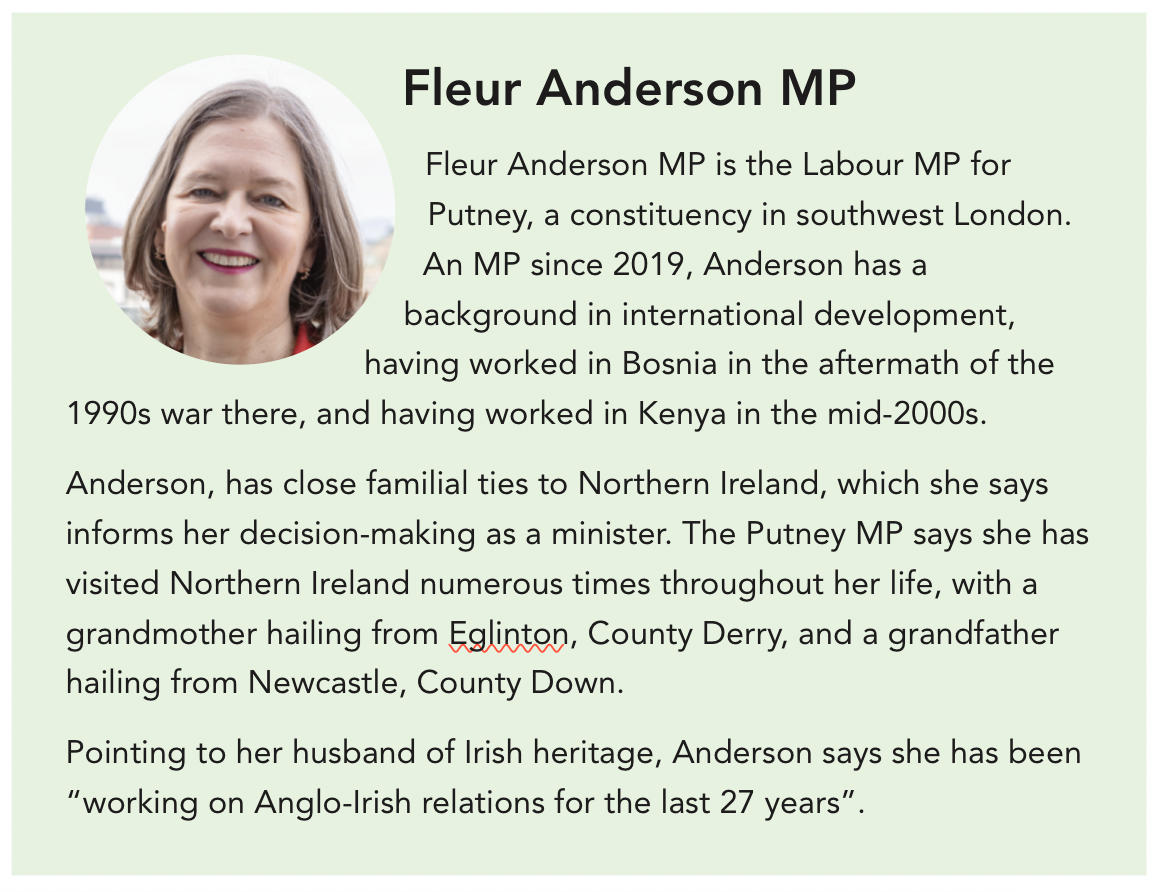Fleur Anderson MP: Calling border poll ‘would be based on opinion polls’

Ten months after the Labour Party was returned to power in Britain, Parliamentary Undersecretary of State at the Northern Ireland Office, Fleur Anderson MP, speaks to Joshua Murray about Labour’s ambitions for the region, its approach to legacy, and the future of Northern Ireland.
Anderson, who has been a London MP since 2019, was appointed to her role by Prime Minister Keir Starmer MP after Labour’s landslide election victory in July 2024. She says that her immediate priority is delivering on the Transformation Fund for Northern Ireland, agreed under the Executive Restoration Package, which was brought about by the introduction of the Windsor Framework under the previous Conservative government.
With £129 million of the £260 million total having been allocated, Anderson says that the Executive’s Programme for Government, with its ostensible “emphasis on reform of public services”, is “aligned to what the Labour government wants to achieve”.
“We have to use existing services, but we have to transform how we deliver these services.”
“We want to create an NHS fit for the future. We want to move ahead and stop the hollowing out of public services, which happened before. We really want to be making sure that public services deliver for the people of the whole of the United Kingdom, including Northern Ireland.”
Anderson acknowledges that this funding is unlikely to bridge the gap in public service delivery performances in Northern Ireland compared to those in England: “It is enough to provide an ability for the Executive to deliver and do some transformation, but it is not enough to cover the whole of the budget.
“It is not just about funding, it is also about leveraging expertise and learning from ways of working from across the United Kingdom, because we have really shared challenges.”
Anderson, echoing sentiments expressed by her party leader, insists that public service delivery cannot be overhauled by just spending more money. Instead, she says that “we have to use existing services, but we have to transform how we deliver these services”.
Brexit
Anderson emphasises that she opposed Brexit. However, when asked if there is any prospect of a Labour government bringing Britain back into the EU, Anderson speculates that the EU would not currently allow the UK to join.
“Even if we wanted to, we could not. At the moment, we need to rebuild that relationship with the European Union and so that is what we are doing.”
When it is put to her that the EU is considering the application of war-torn Ukraine for membership, Anderson responds: “There are other countries being considered for membership as well, and it takes a long time to get there. So even if we potentially did, it would take us years.”
When pressed on the fact that unionists have felt that Northern Ireland’s place in the United Kingdom has been undermined by post-Brexit trading arrangements, Anderson points out that “unionist politicians wanted Brexit, so now we have to make it work”.
She adds: “The Windsor Framework is an opportunity for Northern Ireland business to make the most of dual market access.
“Unionist politicians have been very helpful in pointing out the different things that need to be changed about those arrangements and as we negotiate with the EU, they come up, we solve them, we move on to the next to ensure that businesses have the best opportunity to take advantage of that.”
“I would say to all politicians, let us work through every issue with them. I am not saying there are no issues. There are and we are working through them. Let us improve our relationship with the EU; that reset has been important.”
Legacy
Speaking the day after the Court of Appeal in Belfast called for a public inquiry into the murder of Sean Brown to be conducted “immediately”, Anderson refuses to comment on whether there will be an inquiry. “We will be thinking about it,” she says.
The Labour government has also promised to repeal and replace the Troubles Legacy Act, which essentially gives an amnesty to crimes committed during the conflict. While enacted by the previous Tory government, the legislation was opposed by all the main parties in Northern Ireland, and the Irish Government, which has brought a case against the UK in the European Court of Justice regarding the legislation.
When asked how Labour’s new legislation – which the minister says will be introduced in parliament before the end of 2025 – can garner the support of people in Northern Ireland, Anderson says: “I do not think we are under any illusion that everyone is going to like the proposals we come up with.
“Proposals cannot seem to be working and actually undermine the very point of this [which] is to increase reconciliation. It is about bringing society together.”
Responding to the criticism levelled by unionists that the previous legislation equates paramilitary acts with those of UK state forces, Anderson says: “Immunity was the part of the act that was not even just disliked but not credible.
“We are repealing that, and then also making sure that the Independent Commission for Reconciliation and Information Recovery (ICRIR) is trusted by everyone and can be used by any family. There are many families now that have gone to that that are going through that investigation process. Justice has got to be available equally for all.”
When asked if British soldiers who committed serious crimes while deployed in Northern Ireland should be imprisoned. Anderson says: “Anyone who commits a crime should be jailed; everyone who commits a crime should face justice.
“I know the Veterans Commissioner [David Johnstone] agrees with that and no soldier would disagree with that. They must act within the law and if they commit a crime, then they are outside the law.”
“Unionist politicians wanted Brexit, so now we have to make it work”.
Funding reform
Currently, under the Executive Restoration Package, Northern Ireland is allocated £1.24 in public spending per capita for every £1 that is allocated to public spending in England, following recommendations by the Northern Ireland Fiscal Council. Critics, including former Alliance Party deputy leader Stephen Farry, have argued that this falls short of need in Northern Ireland and that this figure should be adjusted to £1.27. This echoes calls for reform to the Barnett Formula made by the DUP.
When asked whether the current commitment is sufficient, Anderson says: “If there are multiple credible sources to re-examine at that figure, that figure can be looked at again. It may go down, it may go up, but we must also recognise that there is a considerable additional funding, and the priority must be to ensure that current funding is spent properly.”
Constitutional future
When asked if – like the NIO’s previous occupants Chris Heaton-Harris and Steve Baker – she is a unionist, Anderson is ambivalent, initially saying: “I am not sure if I am,” before adding: “I do not think I would be. I am not one community or another. I am not one side or another.”
However, when asked if she favours Northern Ireland remaining part of the United Kingdom, she says: “Yes, I think the union is a strong way of supporting everyone across the United Kingdom.”
Despite this, when asked if she would campaign in favour of maintaining the union in the event of a border poll taking place, she says: “That is up to the people of Northern Ireland. We want to support all communities. If it ever came to a vote, we would support the democratic process.”
One new development, however, comes in response to a question on the criteria required for the Secretary of State to call a border poll. While previous secretaries of state have refused to outline what exactly would be required to meet the NIO’s criteria, Anderson says: “It would be based on opinion polls.”
UK Government ‘power grab’
In 2021, then-UK Secretary for International Trade Liz Truss announced that the then-Department of International Trade (now called the Department for Business and Trade) was to open a new base in Erskine House, the UK Government’s Belfast hub. This was implemented under the UK Internal Market Act, which devolved powers previously consolidated in Brussels to Whitehall, rather than the devolved administrations.
Anderson rejects the assertion by, among others, then-Infrastructure Minister Nichola Mallon, that this was a power grab, instead arguing that it is “perfectly sensible” that UK civil servants work “throughout the United Kingdom”. She further gives no sense that these powers will be relinquished by the UK Government.
“That characterisation of a power grab is wrong. It was really about opening up opportunities for civil servants to be able to work here as well.
“The Department for Business and Trade works hand in hand with businesses here. The opportunities for exporting worldwide for businesses here are growing. So that is a good thing for the Department for Business and Trade to be doing, and everything it is doing is in the best interest of growth across the UK, including Northern Ireland.”






